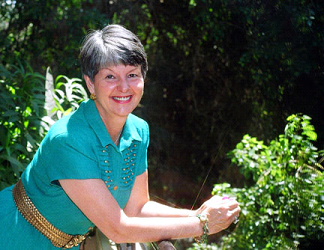A Conversation With Jeanne

You were 54 years old and single, why did you move to Egypt?
In October 2000 I visited Egypt as a tourist. After my trip, I knew I needed to return. I didn't know why, only that I had to.
My children were grown and paid for. For the first time in my life, I was responsible only for myself. I had already planned to sell my home in Washington, D.C. and move to New England, so I decided to put my property on the market and to take a detour to live in Egypt for six months until my house sold and settled. As so often happens, life had other plans. I stayed in Egypt for five years!
Your book cover shows a woman on horseback, the Pyramids and a mosque in the background. Is it meant to portray what modern Egypt looks like today?
I worked closely with designer Peri Poloni to create a cover that integrates the magnificence of Egypt of yesteryear with the sweeping changes in Egypt today. Peri incorporated ripples of wind-blown sand to represent the constant changes within Egypt. The horseback rider (me, by the way-- I used this picture simply because my first readers loved the stories about my riding in the desert adjacent to the Pyramids) is looking through a window/archway reminiscent of the craftsmanship still found in Egypt today that has stood the test of time between ancient and modern Egypt. The shadow of the archway reflected on the sand continues the theme of ancient and modern Egypt intertwined.
What was your first greatest challenge?
I had no idea that my adjustment would be complicated by culture shock. Because I didn't speak any Arabic, the logistics of just finding shops to buy food and a place where I could exchange money were a nightmare, but the most difficult challenge of all was that I had no comprehension of how a single Western woman is perceived in this culture or of the rules I would be expected to practice. My naivety was a curse; it was also a blessing.
Why?
My naivety was a curse because by not knowing the rules, I made many mistakes. While today's Egypt and the modern Egyptian culture no longer require Westerners to adhere to every Egyptian custom, they're not always clearly defined, and as an American in Egypt, given the sexually explicit television shows that are imported there by the West, I quickly discovered that my virtue was immediately suspect. It was a blessing because I led from my heart and was open to each new experience.
How did you dress? Did you keep your head covered?
I dressed more modestly than I would at home. I wore pants with short-sleeved tops, blouses, or long dresses, but I did not cover my head. It is not required.
Why did you write I Am Happier to Know You? Is it primarily an "Egypt book or one of many Women's travel books?"
I Am Happier to Know You covers my first thirteen months in Egypt. It's not an "Egypt book" or one of many "women's travel books" per se. Rather it's the story of a woman's journey into another culture and what she learned about that culture and herself. I Am Happier to Know You evolved from the letters I wrote to family and friends, many of whom were concerned about my safety because tensions had escalated in the region. As time passed, my writing grew into something much bigger. I don't remember when, only that I began to feel compelled to share not just the events and challenges I experienced, but how life in Egypt began to change me from within. It's the story of how embracing our similarities and coming to know each other as human beings is a cause for rejoicing and healing on a personal as well as a global level.
Is I Am Happier to Know You a simplistic look at Egypt today?
Philosopher and author, Lin Yutang said, “Simplicity is the outward sign and symbol of depth of thought.” We all come from our own experiences and assumptions; we receive what we seek to see in the observations of others. I Am Happier to Know You is the story of my experiences and those of the Egyptians and expatriates who shared theirs with me, and so much more. It is also the story of my evolution as a woman from another culture who arrived with the perceptions I was raised with and how the people of Egypt opened my eyes and heart to Egyptians and their culture.